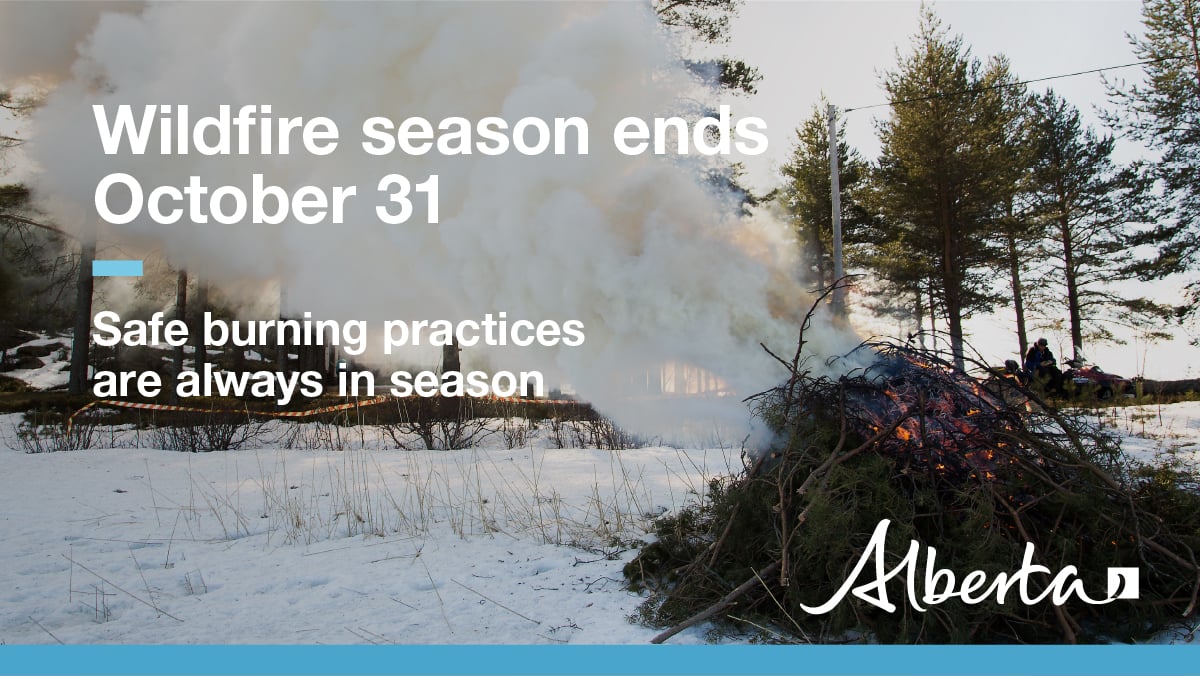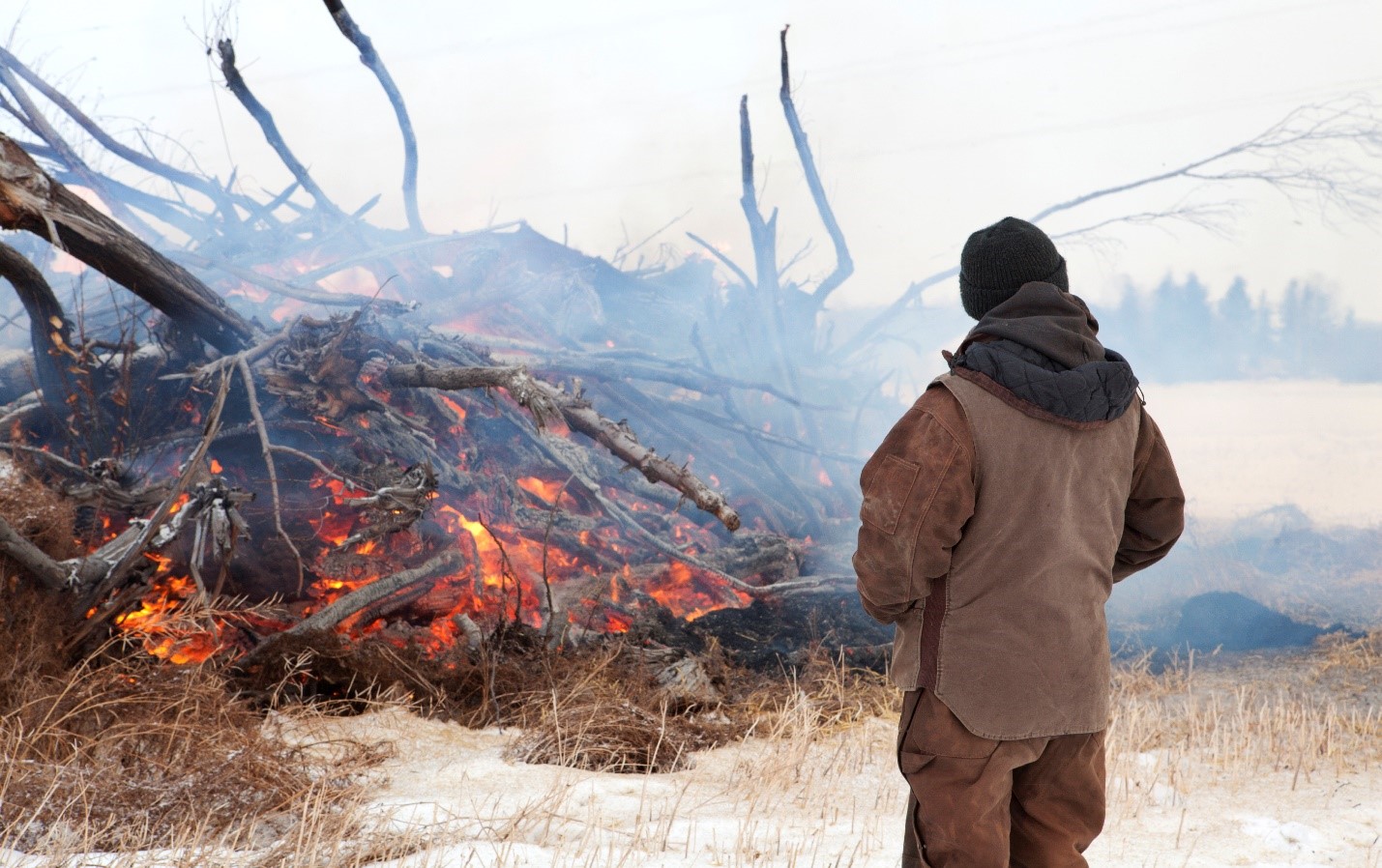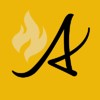
The wildfire danger in the Rocky Mountain House Forest Area is LOW.

From November 1st to February 28th fire permits are not required for burning in the Forest Protection Area of Alberta. Although a fire permit is not required you are still responsible for any fires you ignite outside of the wildfire season. If you are planning on burning debris this winter it’s important to keep safe burning practices top of mind.
Prepare the site:
- Choose a location that is on high ground and so the pile can be 25 meters or more away from structures and standing trees.
- Surround the pile with a fireguard that is at least 15 meters wide on top of bare mineral soil.
- Ensure the pile is clean of dirt so it can burn cleanly and quickly.
Report your site:
- Before burning, notify your local forest area: your start and end dates, description of materials to be burned and the legal land description.
- Signage - check with your local municipal office and/or roadway maintenance company to ensure notification systems are in place.
- Check the weather forecast before you ignite:
- Safe burning practices:
- Have someone on site monitoring the burn the entire time - if it escapes, immediately report it to the local forest area office.
- Have adequate tools, water and equipment on site when burning.
- Only burn what you can control with the equipment, people and weather conditions you have available.
After you burn:
- Spread out the remaining material within the pile.
- Soak the area and ensure both heat and smoke are no longer being produced by the pile - it should be cool to the touch.
- Check your burn site multiple times in the following weeks to ensure it has not reignited.
- If you have any questions about proper burning procedures, visit wildfire.alberta.ca or phone 310-0000.

Smoke
Smoke is always a particular concern when burning in the winter. With the risk of inversions and reduced visibility on roadways due to smoke from a burn it’s important to follow best practices. Here are some tips to consider when it comes to the risk of smoke from winter burning:
- Refrain from burning when an inversion is in place or is forecasted.
- Consult local municipalities and authorities on how to mitigate impacts when undertaking larger winter burning projects near communities or roadways.
- Ensure smoke warning signs are in place before burning within half a mile (800 m) from a roadway. For more information on smoke management and to acquire signs, contact your local municipality. If you are outside of a municipality, contact Alberta Transportation. Read over the Recommended Practices for placement and instruction of a “Smoke Ahead” sign.
- Actively manage burn projects to reduce disposal time and smoke impacts.
- Burning debris in stages will allow you to adapt to changing weather conditions and reduce smoke.
- Monitor weather conditions: lower temperatures and lighter wind speeds can result in stronger inversions. The ideal conditions for burning are typically days with average temperatures and wind speeds over 5 km/h.
- Ensure good snow cover in the burn area (more than 15 cm).
- If you do notice smoke reducing visibility on roads, contact Alberta Transportation at 780 644 1851.
For additional information please contact your local forest area office or visit wildfire.alberta.ca
.png?width=1201&name=WF_Social-images%20(9).png)
WILDFIRE PREVENTION
You can reduce the risk of your off-highway vehicle causing a wildfire by following these simple steps:
-
Before you ride, clean out hot spots and remove debris from your machine.
-
After riding through muskeg or tall grass, stop and remove any build-up from your machine.
-
Carry firefighting equipment such as a small shovel, collapsible pail or fire extinguisher.
-
Wash your quad, trike or bike and keep it clean; do not wash in streams and creeks.
-
Make sure your muffler and spark arrestor are working properly.
-
Stop frequently. Take the time to knock debris from your machine’s hot spots. If the debris is smouldering, soak it, stir it, and soak it again to make sure it’s out.
For more information, please contact:
Provincial Information Officer
780-420-1968
wildfireinfo@gov.ab.ca
RELATED INFORMATION
Websites:
- Alberta Wildfire
- Alberta Fire Bans
- FireSmart in Alberta
- Alberta Emergency Alerts
- Air Quality Health Index
- Wildfire Smoke and Your Health
- 511 Road Reports
- Emergency Preparation
Social Media:
